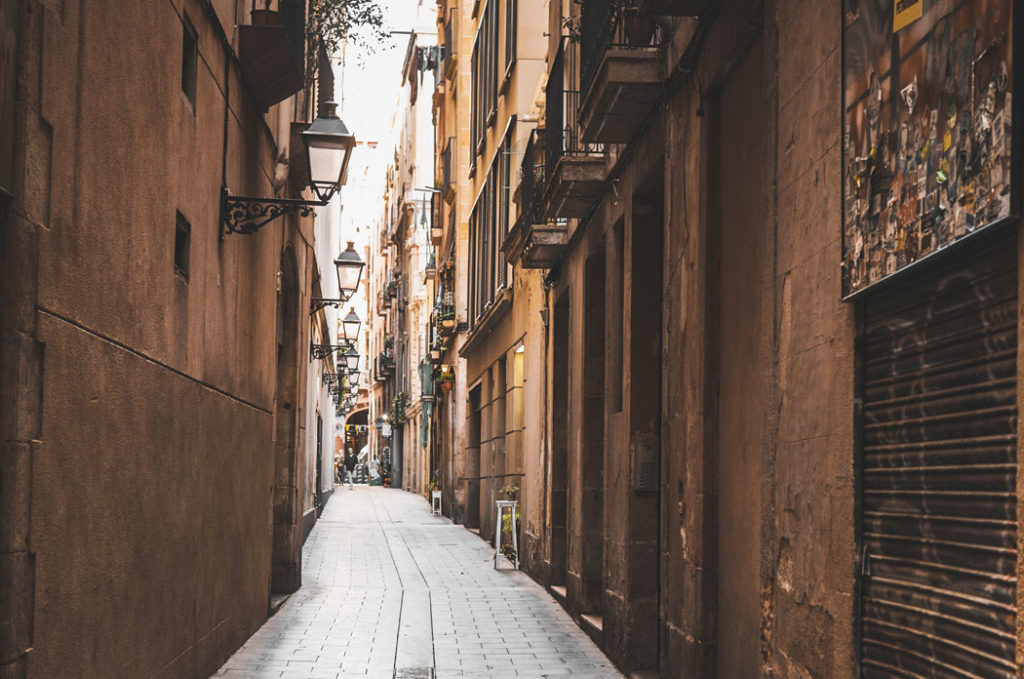
Barcelona, April 2020. Seven weeks ago, on a Friday morning, I showed up at one of the schools where I work. Two days earlier, the government in Madrid had announced that it was closing schools to slow the spread of the virus, but as I work in a private language academy and mostly with professional clients, I didn’t expect the order to affect us that much.
“Living on the shores of the Mediterranean and not being able to go to a cafe a couple of times a day is a concept that is hard to get your head around. Having a coffee in a cafe is almost as normal as breathing.”
As soon as I came through the door, it was obvious that something was up. The director of studies and the receptionist were both on the phone. They did not look happy. The government had extended the ban to all non-essential businesses, so we had to close, too.
I packed my things. I was a little worried about my finances; I only get paid when I work, but I figured the rest of my classes would easily change over to online, so the loss of income would be minimal.
On my way home, the metro was full of teachers carrying books and talking about how they were going to be teaching online. I eavesdropped to get suggestions, and the conversation was so interesting I almost missed my stop.
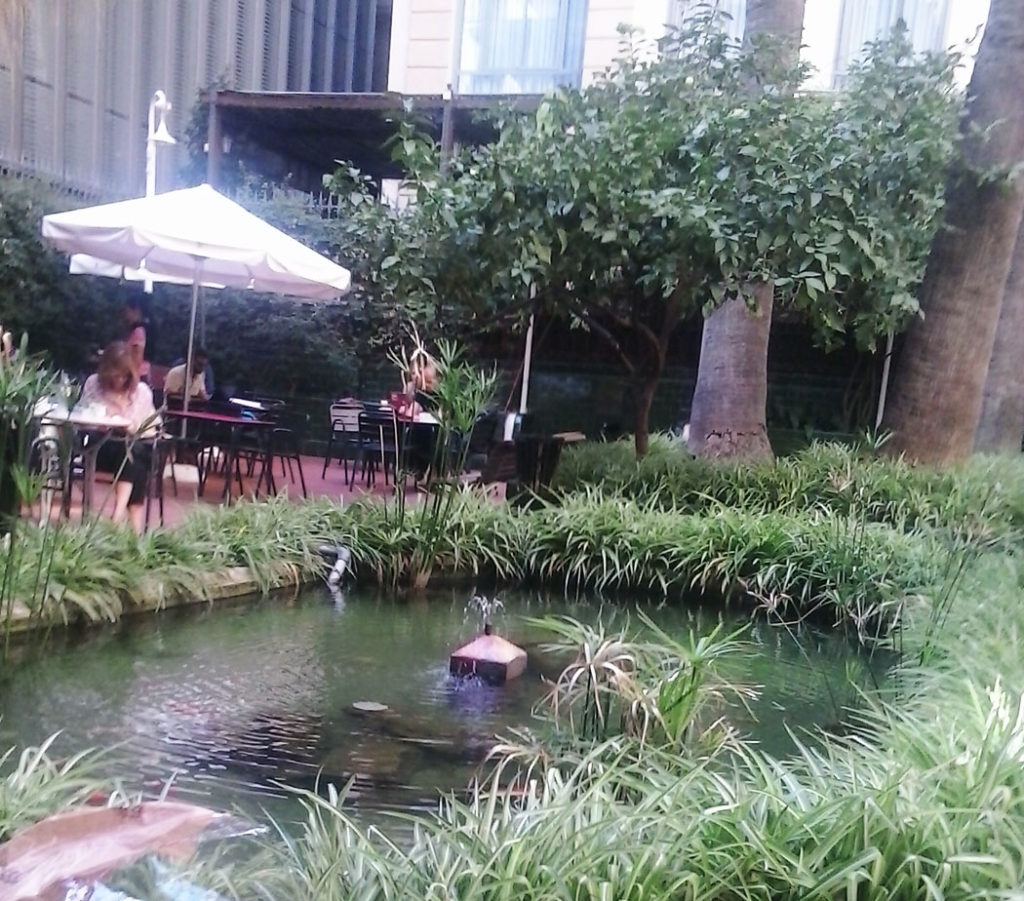
On Fridays I have coffee with a Canadian friend. This week we were meeting at the Ateneu, a private library and cultural/social club that I belong to. As soon as I walked through the massive wooden doors of the Ateneu, I noticed a change. Everyone was huddled in small, somber clusters talking about how the Ateneu was going to close that afternoon. I was surprised. The Ateneu is famous for almost never closing. The majority of the members are retired academics that come every day. They read newspapers in the library and have coffee in the garden. Some even eat their midday meal in the bar as well. For many of them, the Ateneu is like an extension of their apartments. Without it they would have little contact with friends or society in general.
That night I went out to a bar for a drink. It was quiet, for a Friday, and there was a feeling that something bad was coming. One of the best things about Catalans is their love of gallows humor. As I was leaving, the bartender made a joke about last call on the Titanic. A couple of the people sitting at the bar shouted, “Iceberg, iceberg.” It made me feel better. Some things would stay the same.
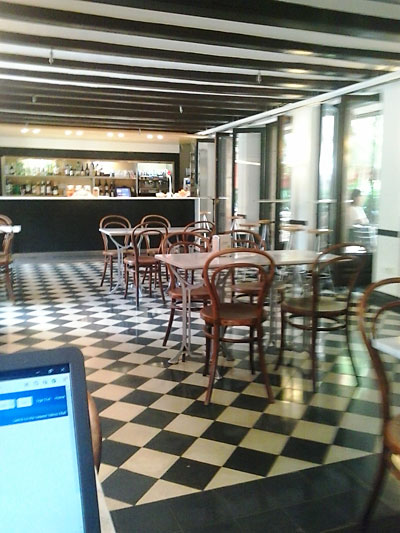
The next morning I went to a cafe to have coffee. The girls working there told me that they were closing that afternoon. I was more than a bit shaken by this. Living on the shores of the Mediterranean and not being able to go to a cafe a couple of times a day is a concept that is hard to get your head around. Having a coffee in a cafe is almost as normal as breathing. As I left, I told myself that it would only be for a couple of weeks.
When I got back to my neighborhood, I noticed that the majority of the shops were closing early, and that there were not a lot of people in the street. This is definitely not normal for Barcelona on a Saturday. I stopped in one of the bigger supermarkets to buy cottage cheese and peanut butter—things I couldn’t get in the market or smaller shops. The customers in the supermarket were panic-buying. The shelves were nearly empty, and the customers in front and behind me in the checkout line were pushing carts full of cans and bottles and bags. The cashier looked at me with a strange smile as I placed my two items on the counter. I smiled back, paid for my things, and calmly walked out.
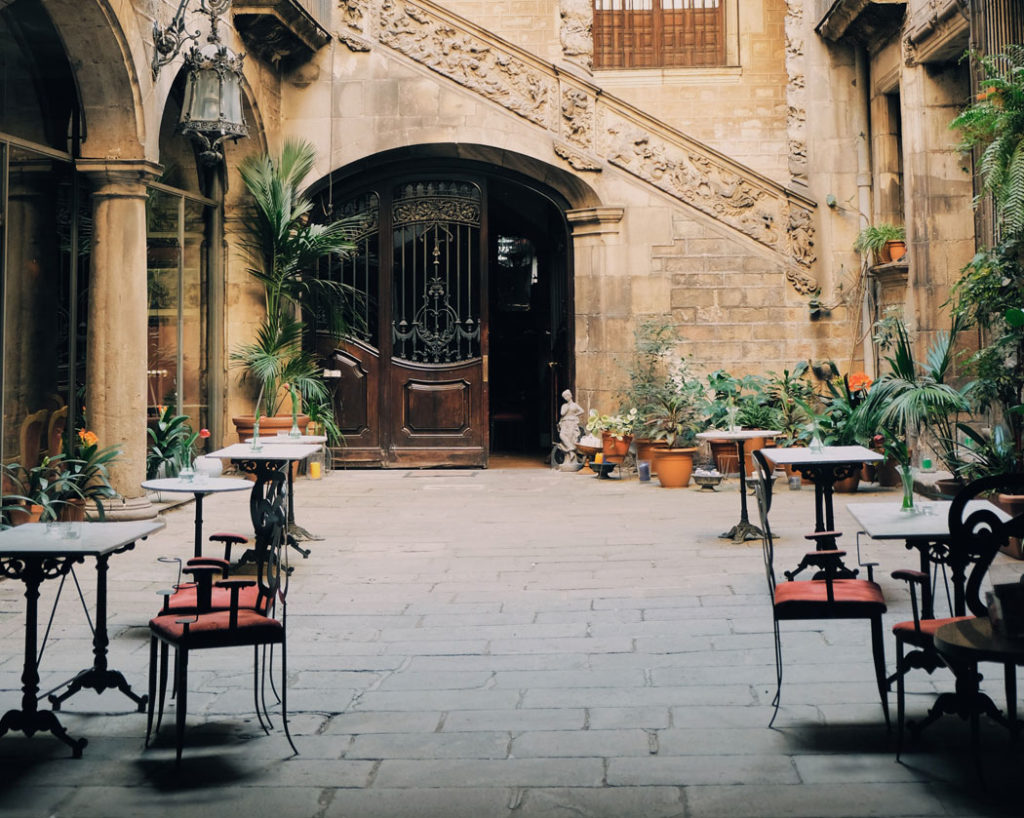
On Sunday morning, I was able to find a place to have coffee, but Barcelona had become a ghost town. In the afternoon I went to the house of some friends who live up on the mountain. We ate lunch on the terrace, and afterwards we watched a movie. When I left, I told them that I wasn’t sure when we would see each other again, but it was said in a joking manner.
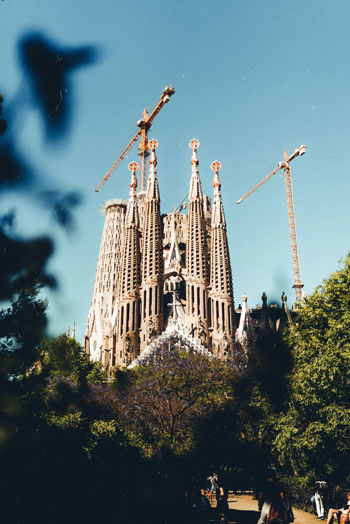
I took the bus home. The route goes by Sagrada Familia, the famous Gaudí church. Usually this area is clogged with tourists. That day I only saw a couple.
On Monday, I was still in denial. I went out for a walk, happy to see that there were still some people in the street, but the only businesses open were supermarkets, bakeries, butcher shops, newspaper kiosks, tobacco shops and, oddly, hairdressers. A couple of bakeries were selling coffee, but only to go. The notion of anything “to go” is so horrendously counter to local culture that I finally became convinced that the reality of the situation was much bigger than I had imagined.
Catalunya is the land where anything worth doing is worth taking your time to do it properly. Three-hour lunches are by no means unusual. People go to cafes to drink coffee or to have a drink. Fast food is seen as a sacrilege. No self-respecting Catalan would ever be caught dead walking in the street sipping a coffee. They are two completely different realms: walking is one thing, and having a coffee is something else. It’s one of the things that every Catalan knows instinctively from birth and which every foreigner living here has had to learn.
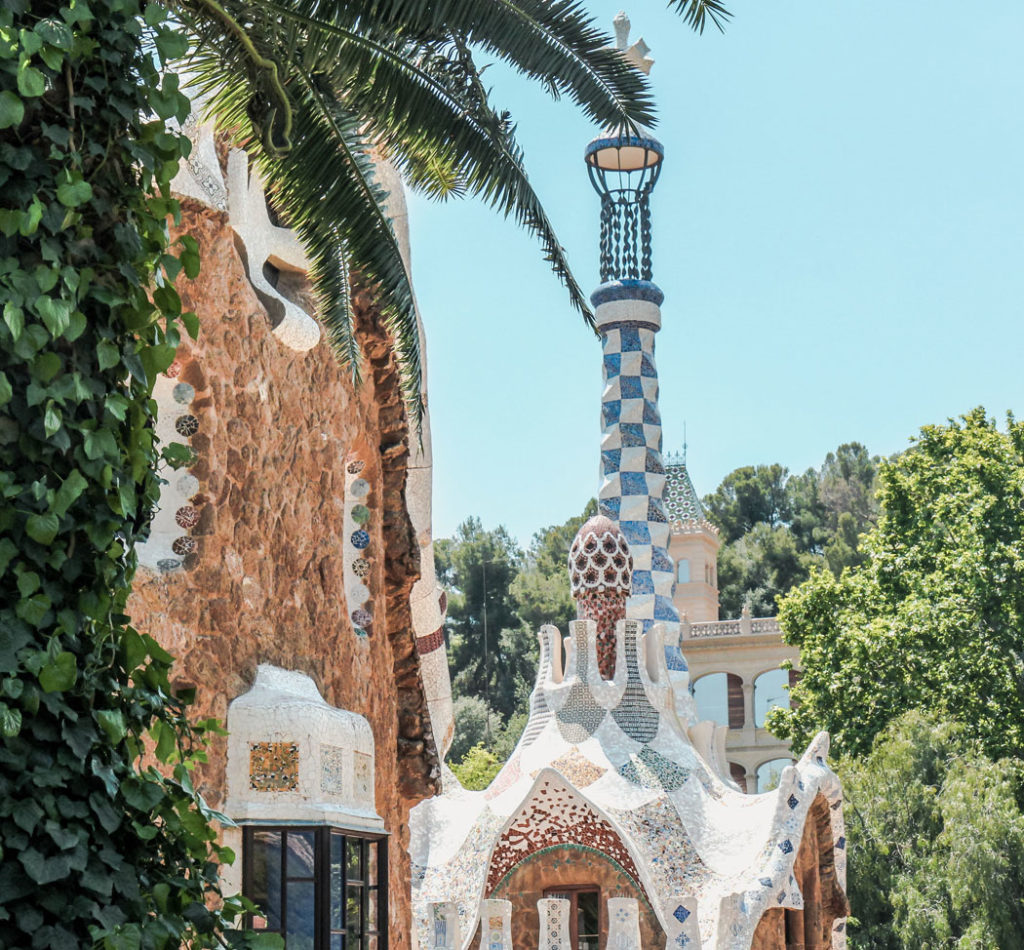
I think that was the moment when I finally realized that this crisis was not going to go away, and that it was going to be a major disruption that would reach into every corner of what had been my daily life for the last three decades. It might seem odd that coffee would bring about my epiphany, but I can’t overemphasize how integral it is to life in Barcelona. I have never had a bad cup of coffee here. It’s always been a ritual for me to have a last good cup of coffee at the airport before I leave and a first cup of coffee as soon as I return. Forget tapas and sangria—those are for the tourists. Coffee is the true heart of Iberian culture. And now I was supposed to accept that coffee to go was my only option. It was like a caffeine-fueled sledge hammer of Kurtz’s final words (“The horror! The horror!”) had been slammed down on my fingers.
I knew instantly that I was going to have to “change the chip,” as the locals say, in order to deal with this new reality. Fortunately, I also knew that Barcelona is as much a quasi-mythical entity as it is a city. It’s one of the biggest advantages of this little corner of the multiverse. Like ancient Athens with the Greek goddess Athena, Barcelona has its own protective metaphor: Our Lady of Mercy, or Mercé, as she is known to its citizens. She is the “go to” co-conspirator of the place and has been since 1218. At that time she was credited with helping to negotiate the return of hostages who had been kidnapped by North African pirates. In 1687, in a more Old Testament motif, she supposedly saved the city from a plague of locusts. But always with the kismet quirk of helping those who help themselves.
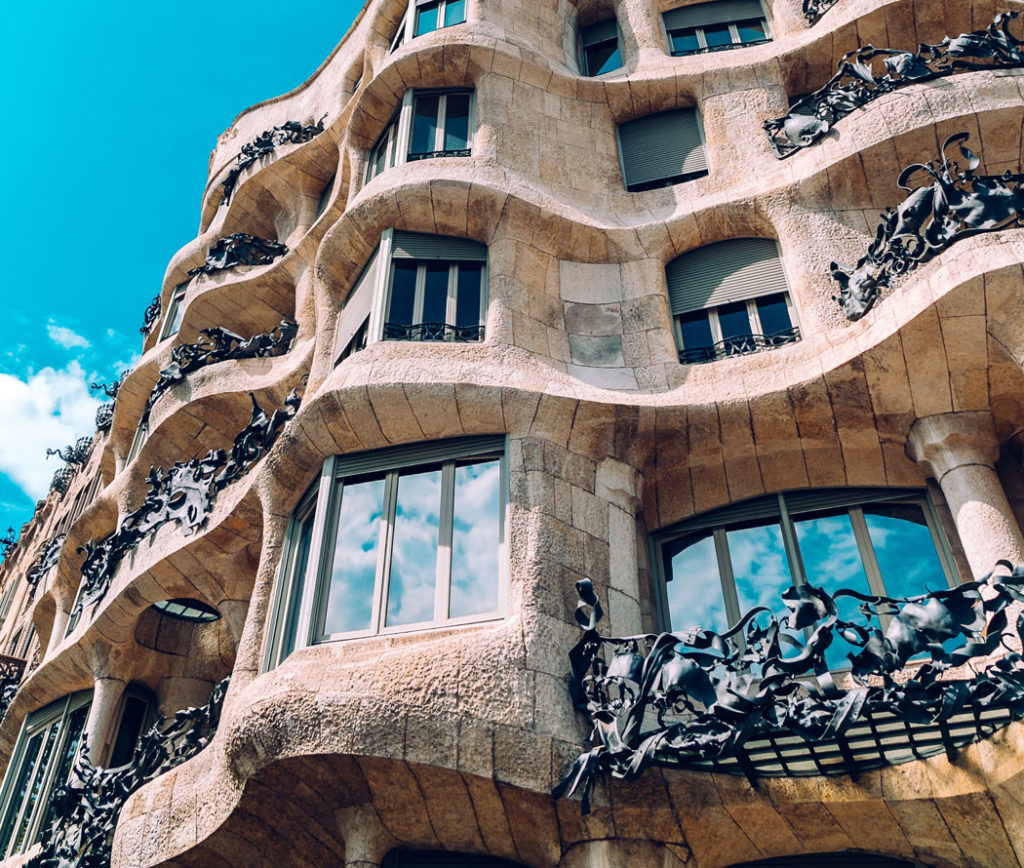
Now I am not trying to convert anyone here. Personal beliefs are just that . . . personal, but collective cultural beliefs are something entirely different. I have always believed in trusting the locals, and even though it has to be said that divine benevolence is currently seen in a more agnostic light, it is hard to deny that this place enjoys a run of luck that would bring Vegas to its knees, but it is a kind of luck that lies under layers of events that, from the surface, more often than not, aren’t seen as beneficial.
I knew immediately what I had to do. The answer was obvious . . . and very, very Catalan. If I was going to stay afloat, I needed a plan. And “when in Rome” seemed as good a plan as any. I just had to recognize where I was. In other words, I was going to have to adapt myself to the parish myth . . . the flora and fauna of the mind of the city. Two things were going to be necessary. I was going to have to make an effort, and I was going to have to look under the bad things to take advantage of them.
The first thing that came to mind was that just before the lockdown had started, a friend of mine, who is a chef, had arrived from Ireland. He was in town to visit his two daughters and basically got trapped here. Though this was a bad thing for him, it was a definite plus for me. In addition to turning my house into a gourmet restaurant, he has a well-honed Irish sense of humor, which is much more cynical than the Pat and Mike jokes of the old pre-Saint Pat’s Leprechaun circuit. His humor is of the new Ireland. Among other things, he has introduced me to an Irish comedy hip-hop duo from Limerick city, The Rubberbandits, and to something called Country and Irish music. He also speaks Gaelic. As I speak Welsh, this has meant that we have had hours of comparative Celtic grammar discussions.
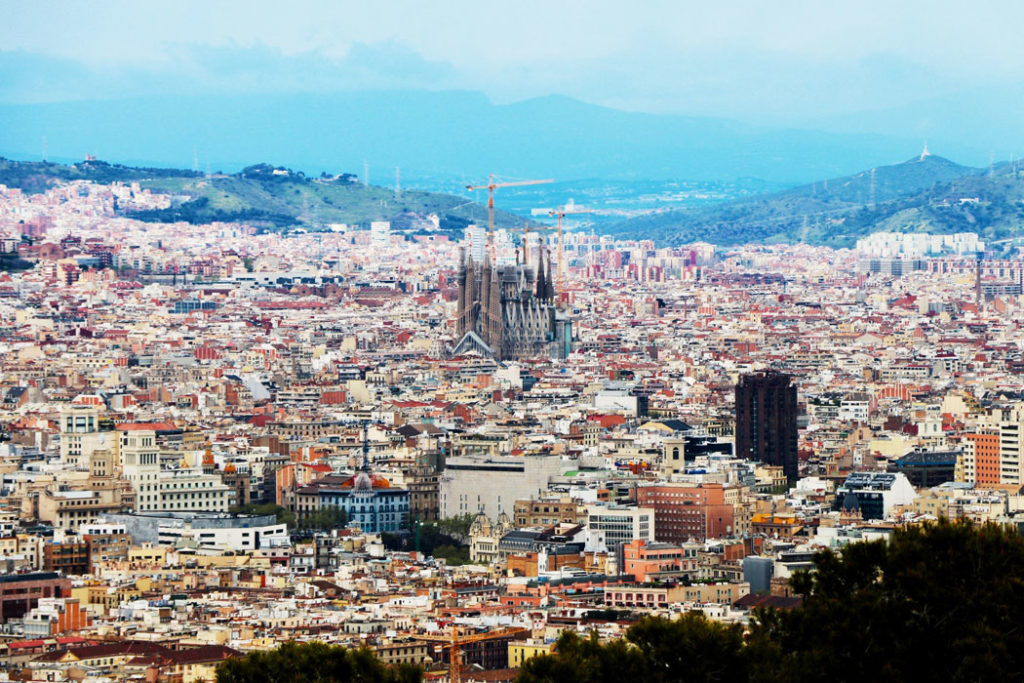
Another immediate advantage was that the pollution level—both air and noise—went down in the city, and more importantly, the citizens had noticed the change and had begun talking about measures to insure that the prior situation did not return after the crisis. There are cities with worse pollution than Barcelona, but there are days when the mountains behind the city look like a gray smudge from the port.
A third positive change was that I discovered that I really enjoyed teaching online. For one thing, I didn’t have to spend an hour going to and from classes on the crowded public transportation system. Another advantage was that without the distractions of the workplace, it was easier for the students to concentrate on the lessons.
But as good as these changes were, I could see that they weren’t going to be enough. I needed to find some way to counterbalance the feeling I had of not just treading water, but of actually wasting time. Lewis Mumford said, “Humor is our way of defending ourselves from life’s absurdities by thinking absurdly about them.” Einstein said that imagination is the greatest creative force.
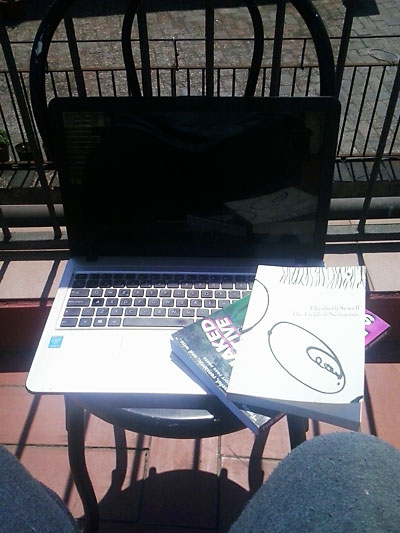
Two years ago during the time of the independence referendum and Madrid’s subsequent crackdown, I had escaped from the turmoil by using both to write my first novel. At the time, it seemed very possible that Catalunya was about to be rocked by political violence. I was nervous. I have lived here for over half of my life, and Barcelona is definitely home, but for some reason during this time I was being drawn back to thoughts of Iowa. So I had decided to set the novel there and use my memories as an escape mechanism. I found that the action of the novel became more and more preposterous as what was happening around me became harder and harder to understand. Working on it allowed me to relax and to maintain a level of hope that things would work out despite all the evidence that they wouldn’t. Nonsense became the only way to make sense of anything. It was an exercise in pure escapism, and it worked. I had a great time writing the novel. The insanity of the two main characters and the ludicrous situations they found themselves in let me keep an even keel despite the changes around me that seemed to be ripping the political idealism of Catalunya and its culture and people to shreds.
During the second week of the lockdown, I realized it was time to concentrate on writing a sequel to my first novel, The Last Generation to Ever Get Old. I decided first on a title. I was going to call the new novel EIEI . . . oh shit. I would follow the same pattern as I had for the first one. Creativity would be my salvation. When I was not teaching online or preparing classes, I would paint, I would play the piano, and I would write every day.
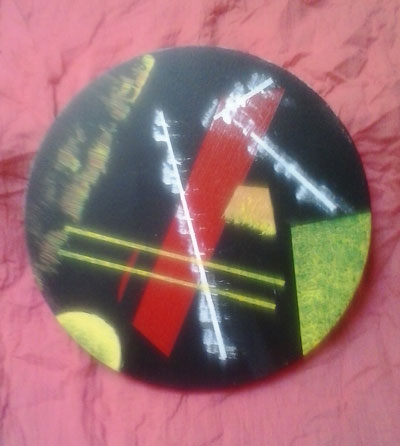
I didn’t get around to painting until the middle of the third week. The problem was that I only had six canvases in the house, and three of them were round. I was also almost out of paint, so my painting would have to be done with what I had on hand. The result was that I had to think in different shades and forms. The paintings have a more earth-tone color scale and the round canvases definitely give the center tension a new alignment, but the good thing was that these limitations actually helped. I learned new things every time I sat down to paint. Now when I look back on it, I feel like the horizons of my painting have been expanded.
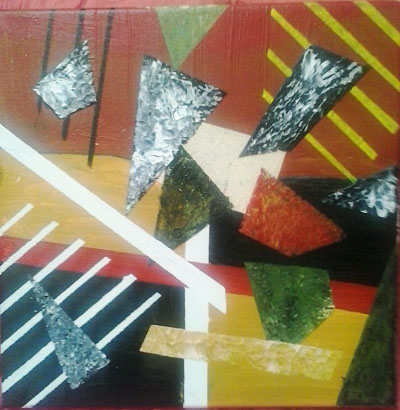
It took me another week or so to start playing piano again. My arm was throbbing from being at the laptop keyboard so much and also from the damp weather. The Mediterranean is usually sunny, but it also has long rainy periods. Also, we are at sea level, so the city is humid. I needed to stretch my muscles, so I decided to try and work out a combination of styles that would allow me to water down the bass line so that it fit inside of what I could and couldn’t play. I hid my inability under an ad-libbed interpretation of genres. It worked, but I also had to keep in mind that because of the lockdown, my neighborhood was very quiet.
On a normal day, the background cacophony of my street reaches a level close to the last minutes of the Hindenburg at Lakehurst. While at first the quiet had been a welcome change, by the middle of the fifth week, it was beginning to get on people’s nerves. It was eerie and seemed almost unnatural. Still, I was sure that nobody wanted to listen to some clown banging on a piano in a way that sounded like Ricky Ricardo meets Hank Williams with Lucy on the drums and Liberace in traction.
Happily, this also worked to my advantage. I decided to only play for twenty minutes each day. It turns out that this is perfect. I don’t play long enough to cause my hands and forearms to become stressed or my neighbors to become homicidal, but it’s long enough to help me to improve. Again, the combination of self-help and looking past the surface had worked. I am still a long way from good, but my hands are getting stronger and sometimes I can express what I want.
Me, playing the piano on YouTube:
The painting and the piano playing worked well enough, but the novel was coming along slowly. Normally I would write in a cafe or in the Ateneu, so I made myself a little work station on the roof terrace of my building. It worked. The sequel now is coming along. I have a third of it more or less finished. It is similar to the first novel but so far has less sex and more polka. The Stooges seem to have replaced Schelling, the German idealist, as the philosophical rudder, but it continues to explore the great questions of the universe through the eyes of a Northwest Iowan.
Like Einstein, I have always believed that creativity is a powerful force, and while he balked at the concept of God throwing dice, as I have been coping with the changes of confinement, I have come to believe that some corners of the universe are definitely subject to an erudite slapstick. This is where we are right now on a Monday night in the seventh or the eighth week. I honestly have lost track. It seems tonight as I write this that we haven’t gone exactly through the looking glass, but we have hung it upside down and backward as we have gone—and continue to go through—a complete remodeling of our comfort zones. The only way to survive is to look for ways to take control of the situation and to use its consequences to improve ourselves.
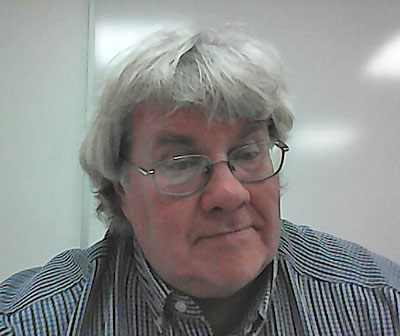
But to do this, we have to expand our interpretation to include the advantages that lie under the surface. None of these options are easy, but the alternatives are just too horrible to concede. It’s like the old joke about how the sinking of the Titanic was a miracle to the lobsters in the ship’s galley. Everything depends upon your perspective, and we have to remember that the muses don’t take dictation, so be flexible. I have no idea what is going to happen, but I think I’ll be able to handle it. As Moe Howard put it once, as only a Stooge could, “If there’s anything I like better than honey and ketchup, it’s baloney and whipped cream—and we haven’t got any!”
